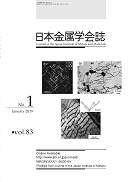
Journal of the Japan Institute of Metals and Materials
Scope & Guideline
Illuminating the future of materials science and engineering.
Introduction
Aims and Scopes
- Metallurgical Processes and Innovations:
Research on innovative metallurgical processes including additive manufacturing, laser processing, and traditional casting methods, focusing on how these techniques influence material properties. - Microstructural Characterization:
Studies that emphasize the detailed analysis of microstructures using advanced techniques such as electron microscopy and X-ray diffraction, revealing insights into grain boundaries, phases, and defects. - Mechanical Properties and Performance:
Investigations into the mechanical behavior of materials, including fatigue, creep, and hardness, often under various environmental conditions to understand their performance in practical applications. - Corrosion and Surface Treatments:
Research addressing corrosion mechanisms and the application of surface treatments to enhance the durability and performance of materials, particularly in harsh environments. - Materials for Energy Applications:
Exploration of materials suited for energy applications, including batteries and catalysts, highlighting advancements in efficiency and sustainability.
Trending and Emerging
- Additive Manufacturing Techniques:
There is a notable increase in research related to additive manufacturing, particularly in optimizing processes and understanding the microstructural implications of various laser and powder bed fusion techniques. - Hydrogen Embrittlement Studies:
The investigation into hydrogen embrittlement is gaining momentum, reflecting growing concerns over material performance in hydrogen-rich environments, particularly in high-strength steels and aluminum alloys. - Sustainable Materials and Recycling:
Emerging themes are focusing on the recycling of metals and materials, showcasing innovative approaches to sustainability in metallurgical practices, which is becoming increasingly critical in modern materials science. - Advanced Coatings and Surface Treatments:
Research on advanced coatings and surface modifications has seen a rise, with a focus on enhancing corrosion resistance and mechanical properties through novel treatments. - Nanostructured Materials:
The exploration of nanostructured materials is on the rise, as researchers investigate their unique properties and potential applications in various high-tech fields.
Declining or Waning
- Traditional Casting Techniques:
Research on traditional casting methods has diminished as newer and more advanced manufacturing techniques such as additive manufacturing gain prominence and attract more research interest. - Basic Alloy Development:
The focus on developing basic alloys with limited compositional variations has decreased, as the trend shifts towards high-performance alloys with specific tailored properties for niche applications. - Electrochemical Processing of Metals:
While electrochemical methods were once a significant area of focus, the increasing interest in alternative synthesis and processing techniques has led to a reduction in publications related to this theme.
Similar Journals

PHYSICS OF METALS AND METALLOGRAPHY
Diving Deep into the World of Metals and AlloysPhysics of Metals and Metallography, published by MAIK Nauka/Interperiodica/Springer, is a respected journal dedicated to the study of the physical properties of metals and their metallographic analysis, offering invaluable insights for researchers, professionals, and students in the fields of condensed matter physics and materials chemistry. With an ISSN of 0031-918X and an E-ISSN of 1555-6190, the journal has a rich history that spans from 1970 to 2024, reflecting a long-standing commitment to advancing knowledge in this vital area of materials science. Although it currently does not offer Open Access options, its strong placement in the academic landscape is underscored by its Q3 ranking in both Condensed Matter Physics and Materials Chemistry, according to 2023 metrics, and a Scopus ranking that places it within the competitive percentile of its fields. The journal is particularly important for those engaged in the cutting-edge research and technological applications of metals and alloys, making it an essential resource for anyone looking to deepen their understanding or contribute original findings to this dynamic discipline.
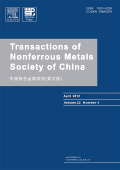
TRANSACTIONS OF NONFERROUS METALS SOCIETY OF CHINA
Exploring innovations in metals and engineering solutions.TRANSACTIONS OF NONFERROUS METALS SOCIETY OF CHINA, published by Elsevier, is a premier academic journal that serves as a vital platform for researchers and professionals specializing in materials science, condensed matter physics, geotechnical engineering, and engineering geology. Established in 1994, this esteemed publication has maintained a robust focus on the latest developments in the nonferrous metals sector, reflecting its significant impact in the field with a Q1 categorization across multiple disciplines. With impressive Scopus rankings—placing it in the top 20% of journals in relevant categories—this journal is recognized for its quality and rigor, providing critical insights into metals and alloys, materials chemistry, and their applications. The non-open access format ensures a dedicated readership among professionals and academics seeking substantial and authoritative research articles. By fostering knowledge exchange, the journal strives to advance the understanding and application of nonferrous metals, making it an essential resource for anyone involved in material innovations and engineering solutions.
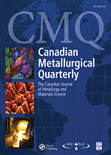
CANADIAN METALLURGICAL QUARTERLY
Unveiling Breakthroughs in Metals and Alloys.Canadian Metallurgical Quarterly is a prestigious scholarly journal published by Taylor & Francis Ltd, dedicated to the field of metallurgical engineering and materials science. With a rich history dating back to its inception in 1962 and continuing through its most recent publications, this journal serves as a vital platform for the dissemination of innovative research, advancements, and critical reviews in metallurgy, metals, and alloys. Positioned strategically within the academic community, it holds a significant impact factor and is currently rated in the Q2 category for Metals and Alloys, and Q3 in Industrial and Manufacturing Engineering as of 2023, showcasing its authoritative role in these disciplines. Although it does not offer open access, the journal remains widely recognized for its rigorous peer-review process, ensuring that published work adheres to the highest standards of scientific quality. Researchers, professionals, and students alike will find invaluable insights and contributions that drive the field forward.

Acta Metallurgica Sinica-English Letters
Connecting Researchers with the Future of Metals and Alloys.Acta Metallurgica Sinica-English Letters, published by the Chinese Academy of Sciences, Institute of Metal Research, is a premier international journal that has been fostering the advancement of knowledge in the fields of Industrial and Manufacturing Engineering and Metals and Alloys since its inception in 1997. With a commendable impact factor and ranking within the top quartiles (Q1) of leading Scopus categories, this journal serves as a vital platform for researchers and professionals to disseminate innovative research findings and groundbreaking methodologies. Notably recognized with a Scopus rank of #34 out of 176 in Materials Science and rank #81 out of 384 in Engineering, it provides a robust space for high-quality, peer-reviewed articles, thus bridging the gap between theoretical advancement and practical application in metallurgy and materials science. Although currently not an open-access journal, its rigorous editorial standards and comprehensive scope ensure that only the most impactful research contributes to the scientific community and industry advancements globally. Acta Metallurgica Sinica-English Letters is an essential read for anyone eager to stay informed on cutting-edge developments within these crucial domains.
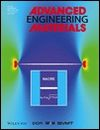
ADVANCED ENGINEERING MATERIALS
Transforming Ideas into Advanced Materials SolutionsADVANCED ENGINEERING MATERIALS is a leading journal dedicated to the field of materials science, particularly within the realm of condensed matter physics. Published by WILEY-V C H VERLAG GMBH in Germany, this esteemed journal has been a crucial platform for disseminating cutting-edge research since its inception in 1999. With an impressive impact factor and ranked in the top quartiles of its categories, it boasts a Q1 ranking in Condensed Matter Physics and a Q2 rank in related materials science fields as of 2023. ADVANCED ENGINEERING MATERIALS serves a diverse readership, including researchers, industry professionals, and students, striving to advance the understanding and application of innovative materials. Frequent contributions to this journal help bridge theoretical advancements with practical applications, fostering a vibrant academic and industrial dialogue. Although currently not an open-access journal, the insights shared within its pages are pivotal for anyone engaged in the dynamic sectors of engineering and material sciences.
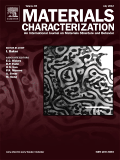
MATERIALS CHARACTERIZATION
Connecting Scholars and Industry for Impactful InsightsMATERIALS CHARACTERIZATION is a leading international journal dedicated to the advancement of knowledge in the field of materials science and engineering. Published by Elsevier Science Inc, this esteemed journal has been disseminating vital research since 1970 and continues to be essential for scholars and industry professionals alike. With an impressive impact reflected in its Q1 quartile rankings across several categories—including Condensed Matter Physics, Materials Science, Mechanical Engineering, and Mechanics of Materials—MATERIALS CHARACTERIZATION stands out as a premier outlet for innovative studies and technical advancements. Researchers can access a wealth of peer-reviewed articles that explore properties, characterization techniques, and applications of materials, fostering interdisciplinary collaboration. With a commitment to high-quality research and comprehensive review processes, the journal plays a crucial role in shaping the future of materials science, making it an invaluable resource for anyone invested in this dynamic field.
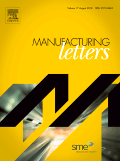
Manufacturing Letters
Connecting Research with Real-world Manufacturing Challenges.Manufacturing Letters is a premier academic journal published by Elsevier, dedicated to advancing the fields of Industrial and Manufacturing Engineering and Mechanics of Materials. Established in 2013, this journal has quickly gained recognition, achieving a Q2 ranking in both disciplines as of 2023, highlighting its significance in the rapidly evolving manufacturing landscape. With an ISSN of 2213-8463, Manufacturing Letters provides a platform for researchers and industry professionals to share critical insights and innovative findings that drive the manufacturing sector forward. The journal is indexed in Scopus, where it ranks in the top 65th percentile for Industrial and Manufacturing Engineering and the 61st percentile for Mechanics of Materials, reflecting its impact in the scientific community. While primarily accessible through subscription, Manufacturing Letters aims to facilitate knowledge exchange, promote sustainable practices, and foster collaboration among individuals passionate about enhancing manufacturing efficiency and material development. This journal is indispensable for anyone looking to contribute to or understand the future of manufacturing.

RARE METAL MATERIALS AND ENGINEERING
Elevating Standards in Materials Science and EngineeringRARE METAL MATERIALS AND ENGINEERING is a vital academic journal dedicated to advancing the fields of materials science, engineering, and metallurgy. Published by the NORTHWEST INST NONFERROUS METAL RESEARCH in China, this journal has been an essential resource for researchers and professionals since its inception in 1993. With a focus on rare metals and their engineering applications, the journal addresses contemporary issues and innovations in materials chemistry and electronic engineering, providing insights into the properties and uses of advanced materials. Although it currently falls within the Q4 category for several categories, including Electrical and Electronic Engineering and Materials Chemistry, its commitment to quality and relevance in the field is evident. The journal offers a platform for researchers to share their findings with the scientific community, fostering collaboration and knowledge exchange in an important area of study. Researchers and students interested in exploring the latest in rare metal technologies and engineering methodologies will find this journal a valuable addition to their academic library.

METALS AND MATERIALS INTERNATIONAL
Connecting researchers to the forefront of materials science.METALS AND MATERIALS INTERNATIONAL, published by the Korean Institute of Metals and Materials, is a prestigious journal dedicated to the advancement of research in the fields of materials science and engineering. With an ISSN of 1598-9623 and a robust e-ISSN of 2005-4149, this journal has established itself as a crucial platform for disseminating innovative findings and key advancements that span condensed matter physics, materials chemistry, mechanics of materials, and the technology of metals and alloys. Its Q1 rankings in multiple categories attest to its high impact and relevance in the academic community, placing it among the top journals in its fields with Scopus rankings that reflect a strong international footprint. Here, researchers, professionals, and students can access cutting-edge research and insights, fostering collaboration and exploration of new materials and their applications. With a commitment to excellence and a convergence of knowledge from 1996 to 2024, METALS AND MATERIALS INTERNATIONAL continues to enhance our understanding of materials and their transformative impact on technology and engineering.

METALLURGIA ITALIANA
Pioneering Insights in the Mechanics of MaterialsMETALLURGIA ITALIANA, an esteemed journal published by the ASSOCIAZIONE ITALIANA METALLURGIA, specializes in the fields of condensed matter physics, mechanics of materials, and metals and alloys. With a history spanning from 1969 to 2024, this Italian journal has consistently contributed to the scholarly conversation surrounding metallurgical sciences and materials engineering. Despite its Q4 ranking in several categories, the journal provides a critical platform for emerging research and advancements in metallurgy, encouraging interdisciplinary dialogue among academics, professionals, and students. Readers can benefit from valuable insights into the latest developments and applications in the field, supported by the journal's commitment to fostering academic rigor and innovation. While access options currently do not include open access, METALLURGIA ITALIANA remains a cherished resource for those dedicated to exploring the nuances of material properties and applications.